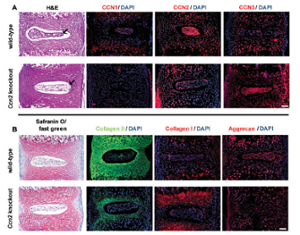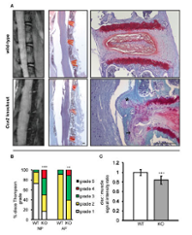Elucidating the role of matricellular proteins in intervertebral disc development, health and disease.
While the association between the loss of notochord cells from the intervertebral disc and the initiation of disc aging and degeneration is well established, very little is known regarding the function of notochordal cells within the IVD or the mechanisms through which they regulate disc homeostasis. These studies capitalize on our novel transgenic animal models to examine the role of the matricellular protein CCN2 in regulating the phenotype and the microenvironment of IVD cells. Our recent findings demonstrate that notochord-specific CCN2 expression regulates extracellular matrix synthesis throughout the IVD during both development and aging-related tissue repair (Bedore et al. Arthritis & Rheumatism).
Loss of CCN2 in notochord-derived cells results in accelerated age-associated disc degeneration, suggesting this conditional knockout mice may be an intriguing model of disc disease.
Further studies into the pathways mediating the response of IVD cells to CCN2 and the role of related matricellular proteins in the IVD may provide intriguing insights and targets for biological treatments of disc degeneration.










